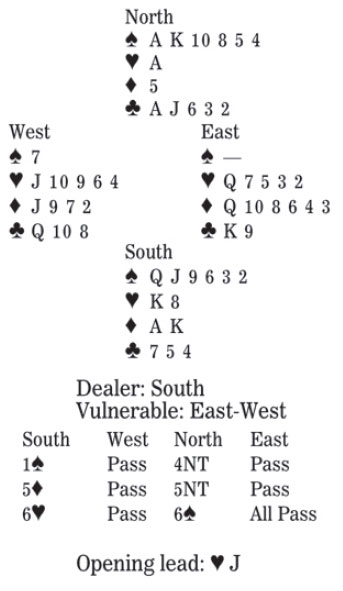William Shakespeare, in "Richard II," wrote, "The purest treasure mortal times afford is spotless reputation; that away, men are but gilded loam or painted clay."
Each suit in a deck of cards contains five honors: ace, king, queen, jack and 10. It also has nine spot-cards, the 10 doing double duty. The honors win most of the tricks, but having useful spot-cards, especially those 10s and nines, may be critical to success for one side or the other.
In this deal, North barrels his partner into six spades. How should South plan the play after West leads the heart jack to dummy's ace?
North's auction was unscientific, but could you and your partner have checked the club situation?
When the dummy came down, declarer realized that he had to hold his club losers to one, which looked difficult with no useful spot-cards. It was unlikely that West had the king and queen, because he probably would have led the club king, not the heart jack. South hoped that East had a singleton or doubleton king or queen. (Yes, West might have had doubleton king-10 or queen-10, but South would have had to guess correctly if West unblocked his royal on the first round of the suit.)
Declarer cashed dummy's spade ace and took his three red-suit winners. Then he played a club to dummy's ace. No honor appeared, but South returned to his hand with a spade and led another club, covering West's 10 with dummy's jack. Yes, it lost to East's king, but on his red-suit return, declarer sluffed his last club and ruffed on the board.



























 Raymond Zhou:
Raymond Zhou: Pauline D Loh:
Pauline D Loh: Hot Pot
Hot Pot Eco China
Eco China China Dream
China Dream China Face
China Face






